Pounds of Trouble: Analyzing Exchange Rate Variances Michael A. Harris Graduate Student Brigham Young University Steven D. Smith Associate Professor Brigham Young University Monte R.
Pounds of Trouble: Analyzing Exchange Rate Variances
Michael A. Harris Graduate Student Brigham Young University
Steven D. Smith Associate Professor Brigham Young University
Monte R. Swain Professor Brigham Young University
William B. Tayler Associate Professor Brigham Young University
"This is the worst EAPC conference ever; and it's happening on my watch! Look at all these complaints! You're going to find out what's going on and who's to blame."
You've had a rough first week at the European Accounting Professionals Coalition (EAPC), and the stack of comment cards EAPC president Shirley Brisbe just handed you is a guarantee that this afternoon won't be much better.
You joined the EAPC events team just days before the opening of the EAPC Annual Conference, a week-long gathering of professionals from around the world that is held at various locations in Europe in May. This year, the 2015 conference is in London, England. By many accounts, it should be a huge success: most members of the association speak English, the weather is outstanding, and the 2015 British economy is booming.
But everything is going wrong. You started to suspect there was a problem based on the mood of some attendees as they walked past your hotel room the first night while you were quietly working on some minor conference arrangements. Though your door was closed, you could hear them complaining (rather loudly) about the conference dinner. You couldn't make out the details through the door, but you learned during breakfast the next day that more than a thousand people crowded into a restaurant that typically only hosts up to 800 people and that the food fell far below expectations. After the conference's first two days, attendees were asked to comment on their experience thus far. The number of negative responses was eye-opening, and Brisbe has called you aside privately to ask for your help.
"It seems that the root cause of the dissatisfaction is
that there just isn't enough money to pay for everything. I understand that funds can be short, but why here, and why now? The conference in Amsterdam went so smoothly last year and in Milan, Lisbon, and Munich the years before? look, we've never come up short until now. Is someone robbing the till? What's different this year that's turning the London conference into such a disaster?"
You promised to get to the bottom of things, which seemed to calm Brisbe's temper for the time being. As you peruse the pile of comments she handed you, a few sentences catch your eye:
"Coffee breaks are low on coffee."
"Crowded, disappointing venue for dinner. I had expected a lot more from this organization."
"In view of many other failings at this event, it's no surprise that my cocktail glass arrived with inferior wine, which, if I am to judge by the amount poured, our hosts were stretching across far too many guests. In fact, it matched my metaphorical glass at this conference? half empty."
A slight smile flickers across your face as you finish reading the last lyrical comment, and you resolve to salvage some cheer in the day by asking a few of the more agreeable EAPC members you find for their candid feedback. Additionally, you use your phone to send off quick emails to a few departments asking for cost-related data from the first days of the conference so that you'll have some hard numbers for your analysis.
IMA EDUCATIONAL CASE JOURNAL
1 VOL. 9, NO. 4, ART. 3, DECEMBER 2016 2016 IMA
Having finished that task, you notice that the attendees have begun to file out of their conference rooms. You put your phone in your pocket, tuck the cards away, and set your eye on the nearby coffee area as a likely place to have a conversation about these shortcomings at the London conference. You set off to mingle and see what you can learn.
AN IMPORTANT EXCHANGE
As you approach a pleasant-looking gentleman, he takes it upon himself to break the bad news: "The coffee is?"
"Gone?" You ask.
He grins, and you get the feeling this has been a common topic of conversation here. Seizing the opportunity, you introduce yourself and learn his name: Curt Sterling.
You ask Sterling if he's noticed anything else that seems to be going wrong. As you listen to his answers, you notice that his observations are in line with the comment cards? most things at the conference just seem to be in poor quality and short supply. You mention that this wasn't a problem with other recent conferences.
"Well, you've got to consider exchange rates," Sterling says. "Someone here pointed out to me that out of all the countries where we've had conferences recently, Britain is the only one not using the euro. She figured the EAPC keeps most of its financial records and budgets in euros and that they haven't had to deal with volatility in currencies until now."
"Interesting thought," you acknowledge. Sterling is right about at least two points. First, you do happen to know that all of the budgeting for this event was, in fact, prepared in euros. Second, Britain is the only host country for the EAPC whose currency, the pound, floats independently of the euro.
Sterling continues: "It makes sense; the pound has moved quite a bit against the euro this year. The rumor going around now is that the EAPC probably didn't see this economic growth coming, so it planned everything for the conference using whatever the exchange rate was back at the time the budget was set. Obviously, that rate has changed. The boom is great for some people, sure, but it makes everything more expensive for the EAPC in Britain if its home currency is the euro. No wonder it's short on funds this year."
Thinking further on this idea, you recognize that if prices have been stable in Britain, then as the pound rises against the euro, each euro will buy fewer pounds and, hence, fewer British products than it did before. So, put another way, British products would indeed be more expensive in euros than they were before. Sterling's hunch may just be a vital clue in solving this mystery.
SOME HISTORY
Before the introduction of the euro in the European Union in 1999, many European countries were already pegging their currencies together, allowing for only slight fluctuations between them. This arrangement, known as the Exchange Rate Mechanism (ERM), began in Europe in 1979. It came after the breakdown of the earlier Bretton Woods system, which pegged many currencies to the U.S. dollar and gold from World War II to 1971. See the timeline in Exhibit 1.
Britain briefly attempted to join the ERM in 1990, but its interest rates were much higher than those of Germany, whose currency, the mark, had become the de facto ERM currency. Speculators began taking the position that keeping the pound tied to the mark in the face of such a large interest rate difference between the two countries would
Exhibit 1. Evolution of the European Union Exchange Rate Mechanism
IMA EDUCATIONAL CASE JOURNAL
2 VOL. 9, NO. 4, ART. 3, DECEMBER 2016
be unsustainable for Britain. On September 16, 1992, a day known as "Black Wednesday" in Britain, those speculators noticed market signals and began a massive short sale of the pound. The British government, suddenly facing enormous downward pressure on its currency not only from market forces but now also from the speculative short sales, could no longer keep the pound above the lower limit allowed by the ERM and was forced to withdraw from the program. The pound was allowed to float, temporarily losing much
of its value, and George Soros, the most prominent of the speculators, made US$1 billion on the transaction.1
Due to these events, when most ERM countries adopted the euro in 1999, Britain wasn't among them, despite being a member of the European Union. Those who adopted the euro formed a new economic area called the Eurozone, and the euro became their accounting currency on January 1, 1999. But no euro banknotes or coins existed for three more years. The euro currency was finally introduced on January 1, 2002, and on that day nearly all merchants, banks, and ATMs in the Eurozone started dispensing only euros rather than the legacy national currency. Legacy currency was still accepted in most of those countries during a brief transition period (change would be given in euros); by the end of February 2002, however, the euro was the only currency recognized in the Eurozone. Today, the economic area has grown to include 19 members, but still not Britain.
Besides the London conference, the only EAPC Annual Conference held outside the Eurozone since that area's creation was in Copenhagen, Denmark, in 2002. Denmark uses the krone as its national currency, but in an arrangement known as ERM II, it pegs the value of the krone directly
and tightly to the euro. There couldn't have been much volatility between the two currencies in 2002, and from what you understand, there were no budget problems for the Copenhagen conference.
The EAPC no longer stores its financial records for years before 1999, but all of its budgeting was done in German marks during those years. While foreign exchange was an issue, the other currencies were mostly in the ERM, meaning that there was little volatility for most years. In any case, none of the people who would have dealt with occasional volatility in foreign exchange then are involved with the budgeting or execution of the London conference now. Further, none of the longest-term EAPC members you talked to remember any apparent problems with conference funds until now.
WHO'S TO BLAME?
Based in large part on your findings, Brisbe will hold one or more people within the EAPC accountable. This means that your task of pinning down the source of the problems is inseparable from implicating at least one person in the debacle, whether or not you actually name that person in your report. You feel the need to be extremely careful in your analysis, not only for the sake of correcting mistakes, but also to be fair to your colleagues in the organization.
You find the exchange rate theory intriguing, but you know it's also possible that the explanation could be something else. For example, you know that more people are attending this conference than were originally planned, though you aren't sure how big the discrepancy is. Could over-attendance be the reason for the budget woes? Cathy Hansen, EAPC membership director, was responsible for managing outreach, invitations, and registration for the London conference, and she provided the estimated number of attendees during budgeting. If Hansen is behind the supposed budget shortfall, Brisbe will investigate further from there. Higher attendance may be commendable since one goal of the EAPC is to increase attendance at its conference events, but Hansen should probably be expected to give a fairly accurate estimate (even if those estimates include substantial growth). It's possible that Hansen was intentionally sandbagging?predicting low attendance to set a lower bar she would easily clear.
Todd Harmon, the head of purchasing for events, was responsible for estimating the per-person costs of the various goods and services to be used at the London conference. If anyone should be able to give good price estimates, it's Harmon, who's been managing purchasing at the EAPC for the last eight years. Under normal circumstances, if it could be shown that the current catastrophe is a result of underestimating prices, then Harmon and his budgeted costs would face serious scrutiny. But these may not be normal circumstances. Offhand, you aren't aware of any major economic swings that would have impacted pricing; but the details are in the data.
If the shortfall was driven by price fluctuations, you recognize that Harmon's best defense would be that factors outside of his control in London?namely, an unfavorable movement in exchange rates?were what caused prices to be higher than expected. But that, in turn, could put some pressure on EAPC treasurer Mike Cannon for failure to properly plan for, or perhaps even hedge, the foreign exchange risk ahead of the London conference.
IMA EDUCATIONAL CASE JOURNAL
3 VOL. 9, NO. 4, ART. 3, DECEMBER 2016
Of course, there's always the possibility that there's no significant budget shortfall and that from the outset the event was simply planned to have poorer quality goods and services than in previous years. In that case, Harmon would bear some responsibility, but the bulk of the responsibility for low quality would be borne by Lisa Stevens, director
of the London conference. In the end, you have no reason to suspect foul play?this particular mystery isn't likely to involve fraud?but you haven't ruled out negligence.
You keep all of these possibilities in mind as you begin your analysis.
HARD DATA
As you look through the responses to your emailed requests for information, you recognize that much of the cost data are incomplete?many expenses haven't yet been paid from EAPC accounts. You determine that the best place to start your analysis is with the disastrous welcome dinner, since that bill has already been paid. Hopefully the dinner information will help you find out what went wrong.
The data you have to work with, at least for now, are as follows:
Actual attendees: 1,234
Expected attendees: 1,220
Actual cost per dinner: 58
Budgeted cost per dinner: ?60 (The budget was set at the beginning of December 2014.)
Dinner costs (in British pounds) were incurred on May 19, the day of the event.
Dinner costs were invoiced and paid (in euros) on May 21 from EAPC accounts.
Daily midpoint exchange rate information are listed in Table 1.
Table 1. Daily Midpoint Exchange Rates
QUESTIONS
What is the static budget variance (that is, the difference between the original budget and actual results) for the dinner?
Break down the static budget variance into a volume variance and a flexible budget variance for the dinner. What do these variances tell you?
Break down the flexible budget variance into price and efficiency variances. What do these variances tell you?
Break down the price variance into a charge variance and an exchange variance. What do these variances tell you? Note that the charge variance is based solely on the difference between the budgeted price and actual price (based on the currency rate used in the organization's budget). The exchange variance is based solely on the difference between budgeted exchange rate and the exchange rate actually used in paying the invoice.
Based on your calculations, what is the primary source of the problems with the dinner? Who appears to be most directly responsible for the dinner failure? Assuming that the problem behind the dinner is the general cause of the EAPC's challenges this year, what recommendations would you make to avoid these problems in the future?
EPILOGUE
It's June 2016, and work is going well. In May, you had helped pull off a tremendous (and euro-based) success at the EAPC Annual Conference in Vilnius, Lithuania, and you were recently promoted. Things have slowed down briefly in the lull between the European conference in Vilnius and the upcoming regional conferences, which will take place in various places across Europe in August. As you eat your lunch, you mull over the possibility of taking the rest of the day off.
Then you receive a frantic phone call. Maria Duval, an EAPC volunteer, introduces herself quickly and then explains the situation:
"I'm overseeing the Northwest region's conference, and we decided to have it in London. Why did we have to choose London? We planned all the budgets meticulously; we checked and re-checked the prices, the invite lists, everything?and now this news breaks. I don't want to see another London disaster; Shirley Brisbe told me you have some well-earned experience with exchange rates, and that last year's London conference failed much more gracefully than it might have otherwise thanks to you. Could you help us here in the Northwest?"
Date
December 1, 2014
December 31, 2014
May 19, 2015
May 21, 2015
Cost of 1, in euros
?1.25789
?1.28261
?1.38764
?1.40346
You called the restaurant, and the manager confirmed that menu price changes take effect only once a year, in September.
IMA EDUCATIONAL CASE JOURNAL
4 VOL. 9, NO. 4, ART. 3, DECEMBER 2016
"Of course," you say.
The news Duval is talking about has been the dominant story in many outlets for the past few days. Contrary to most expectations, on June 23, 2016, Great Britain voted in a referendum to withdraw its membership in the European Union. The market reacted strongly, and the value of the pound has fallen to a 31-year low.
This wasn't Great Britain's first referendum vote relating to European Union membership. Britain joined the European Community (EC) in 1973 and held a referendum vote on membership two years later in 1975. That vote turned out differently: the majority voted to stay in the EC. The EC existed alongside, and then was absorbed by, the European Union. The Union was created in 1993 when the Maastricht Treaty, signed by the EC member countries the previous year, took effect. The treaty also provided for a European economic and monetary union, which eventually led to the creation of the euro. However, in negotiations, Great Britain received an opt-out that would allow it to continue using the pound if desired. Britain also received an opt-out from the Schengen Agreement, which abolished border controls within the European Union, and from a social chapter of the Maastricht Treaty, which Britain has since accepted. Those are the conditions under which Great Britain agreed to join the European Union. Now it appears that Great Britain will be leaving, and it's a tumultuous time for the British pound, as shown in Exhibit 2.
ADDITIONAL QUESTION:
6. Assuming the pound doesn't reverse course, what type of exchange rate variance?favorable or unfavorable?do you expect for Duval's Northwest region conference in August? Should she be concerned about another major conference failure in London? Assume, for example, that the EAPC continues to budget conference dinners at ?60 per plate. If the actual cost in August turns out again to be 58, and Duval planned for and actually has 100 attendees, what happens with the price variance?
ENDNOTES
1See "Billionaire who Broke the Bank of England," The Telegraph, September 13, 2002, http://www.telegraph.co.uk/finance/2773265/ Billionaire-who-broke-the-Bank-of-England.html.
ABOUT IMA (Institute of Management Accountants)
IMA, the association of accountants and financial professionals in business, is one of the largest and most respected associations focused exclusively on advancing the management accounting profession. Globally, IMA supports the profession through research, the CMA (Certified Management Accountant) program, continuing education, networking and advocacy of the highest ethical business practices. IMA has a global network of more than 75,000 members in 140 countries and 300 professional and student chapters. Headquartered in Montvale, N.J., USA, IMA provides localized services through its four global regions: The Americas, Asia/Pacific, Europe, and Middle East/Africa. For more information about IMA, please visit www.imanet.org
Exhibit 2. ?/1 Exchange Rate History (Daily Spot Rates - Mid)
1.3200 1.3000 1.2800 1.2600 1.2400 1.2200
1.2000 Jun 1, 2016
Jun 8, 2016
Jun 16, 2016
Jun 23, 2016
Budgets for the regional conference were set on March 1, 2016, when the exchange rate was 1.28280. Today, June 28, 2016, the exchange rate is 1.20402.
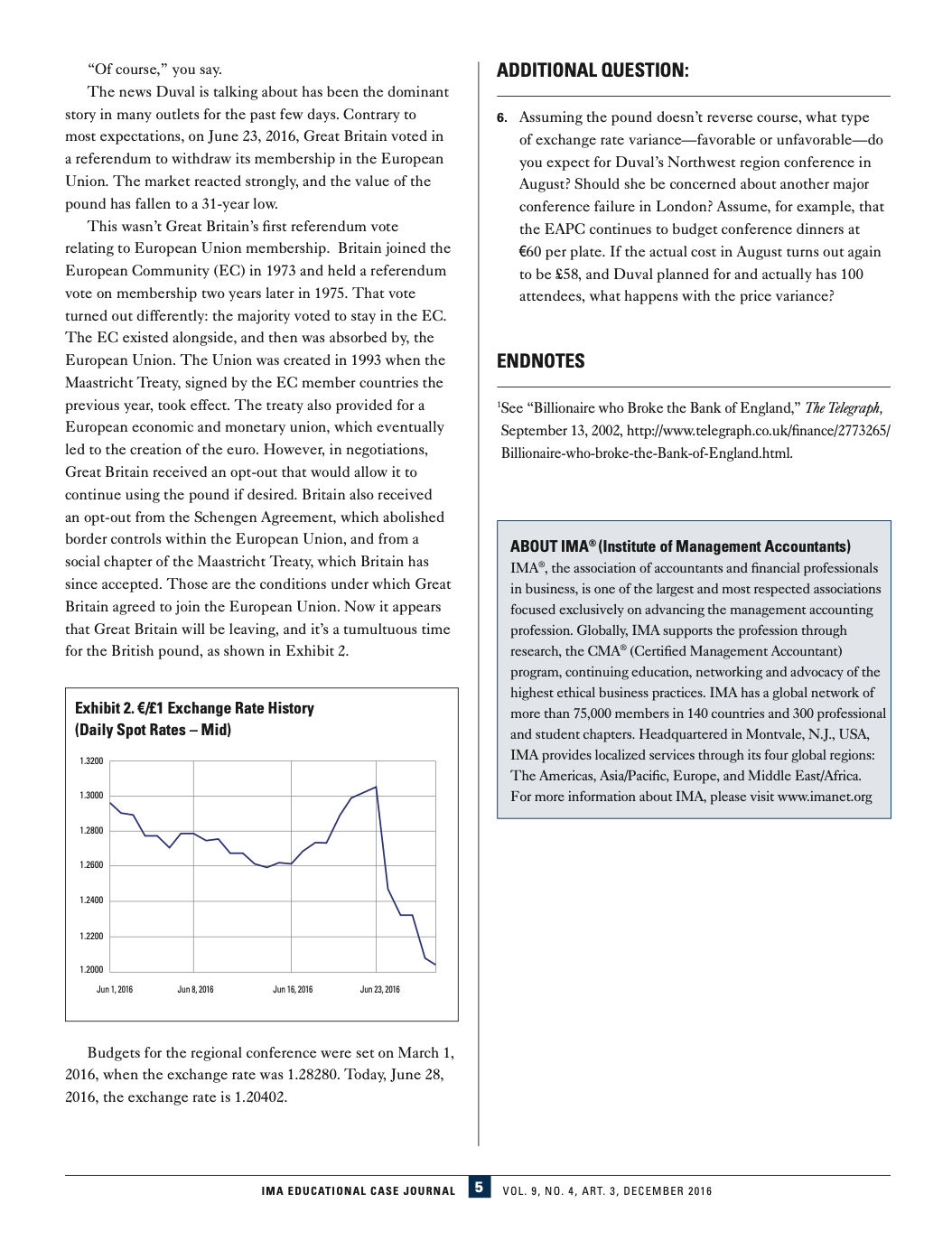
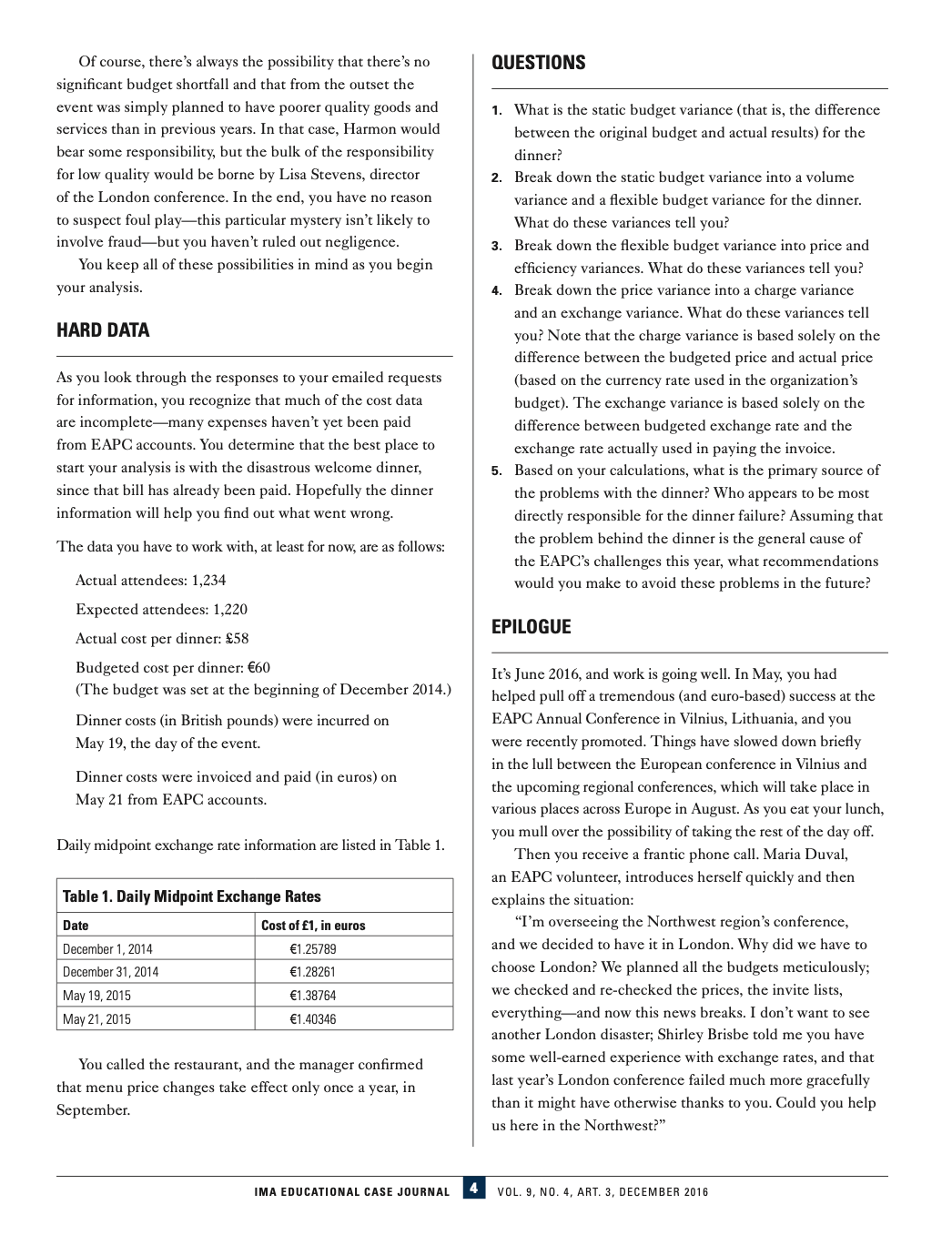
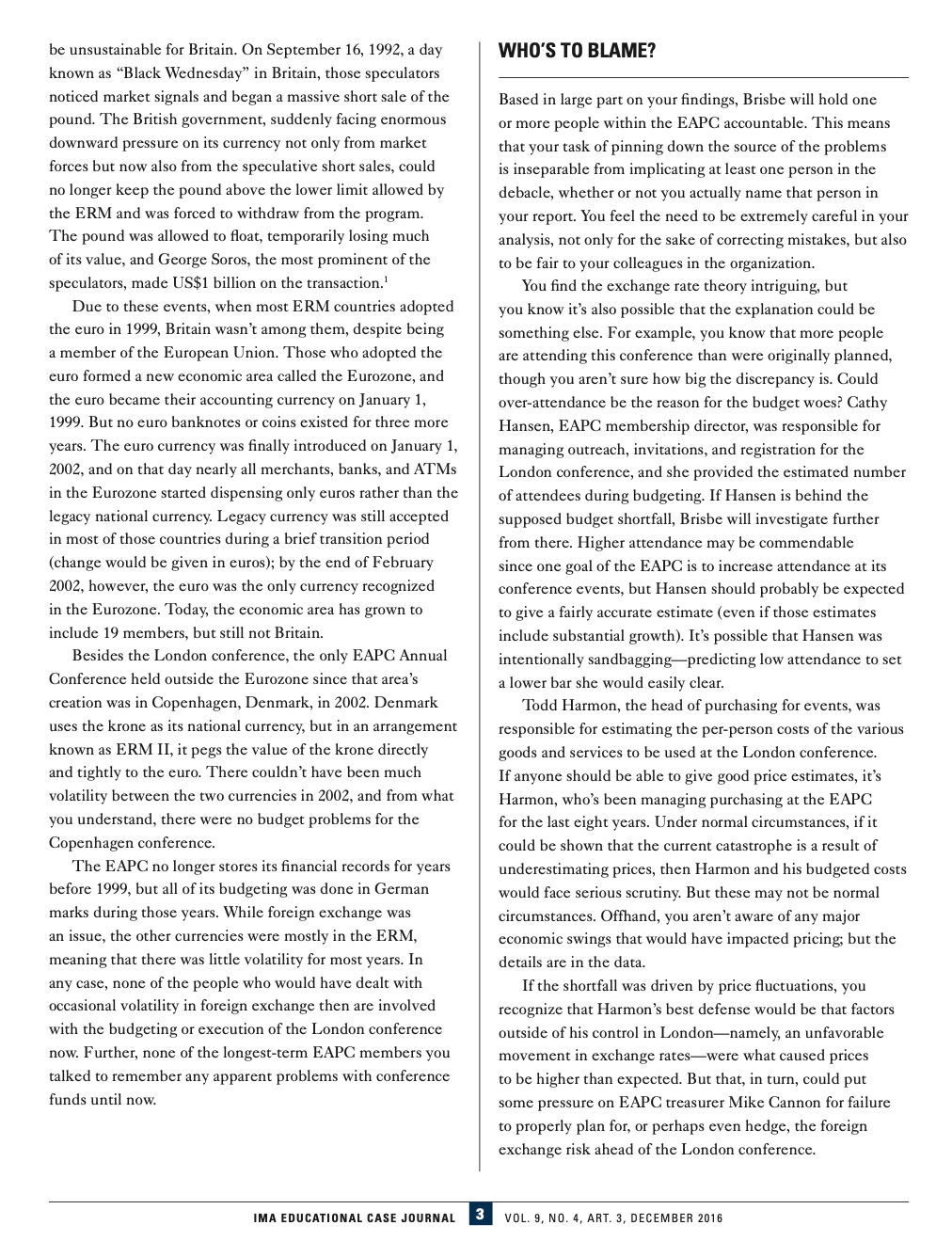
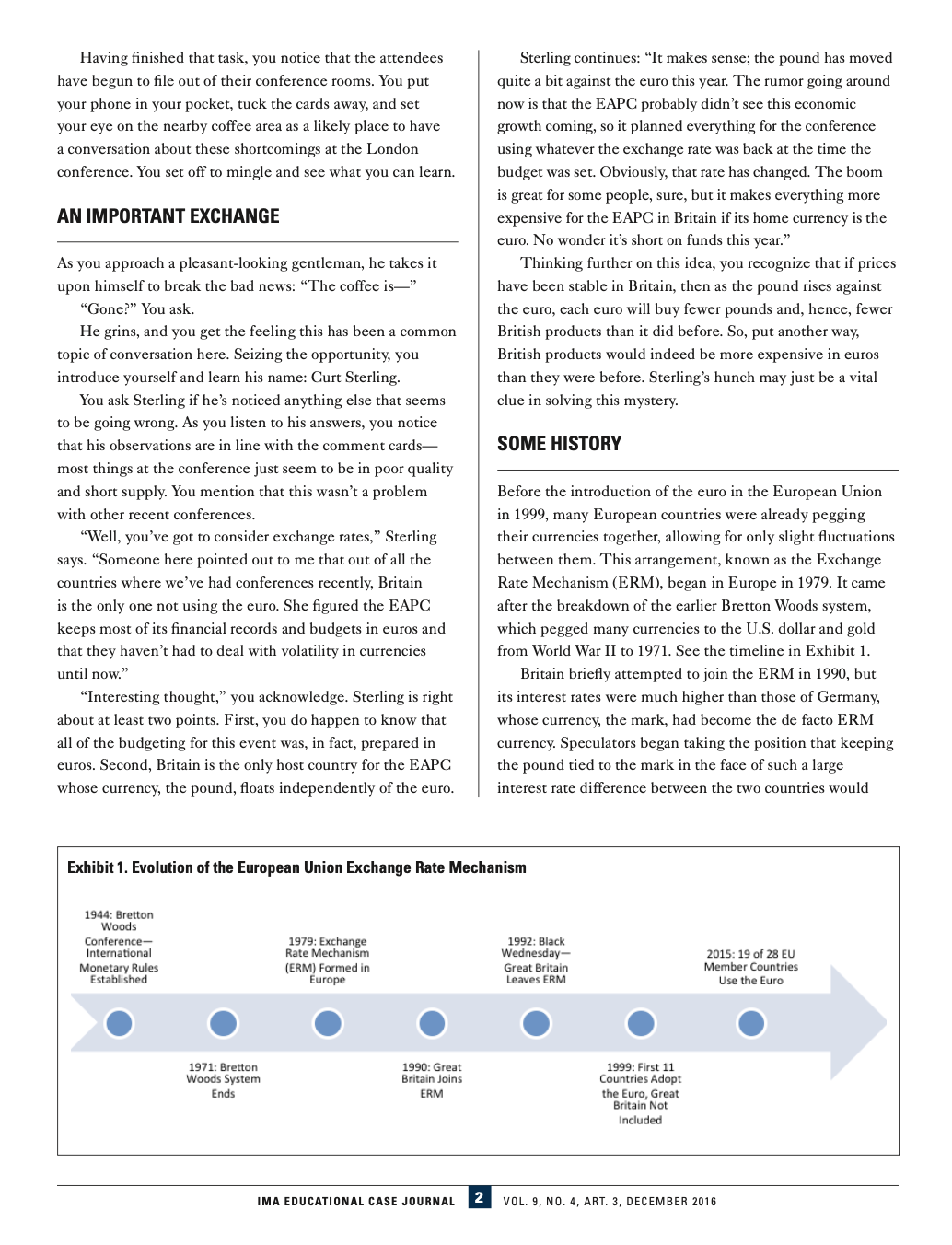
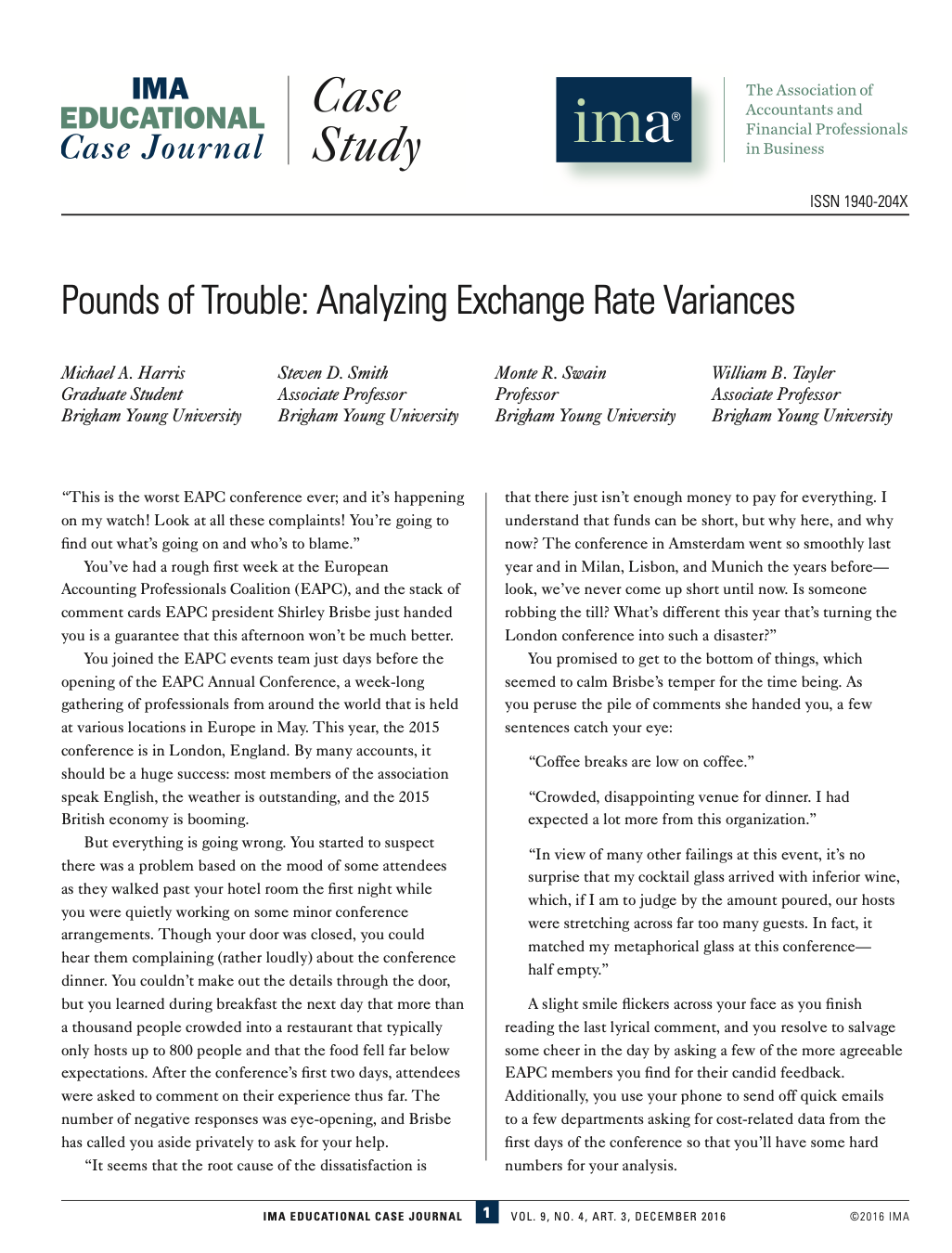
"Of course," you say. The news Duval is talking about has been the dominant story in many outlets for the past few days. Contrary to most expectations, on June 23, 2016, Great Britain voted in a referendum to withdraw its membership in the European Union. The market reacted strongly, and the value of the pound has fallen to a 31-year low. This wasn't Great Britain's first referendum vote relating to European Union membership. Britain joined the European Community (EC) in 1973 and held a referendum vote on membership two years later in 1975. That vote turned out differently: the majority voted to stay in the EC. The EC existed alongside, and then was absorbed by, the European Union. The Union was created in 1993 when the Maastricht Treaty, signed by the EC member countries the previous year, took effect. The treaty also provided for a European economic and monetary union, which eventually led to the creation of the euro. However, in negotiations, Great Britain received an opt-out that would allow it to continue using the pound if desired. Britain also received an opt-out from the Schengen Agreement, which abolished border controls within the European Union, and from a social chapter of the Maastricht Treaty, which Britain has since accepted. Those are the conditions under which Great Britain agreed to join the European Union. Now it appears that Great Britain will be leaving, and it's a tumultuous time for the British pound, as shown in Exhibit 2. Exhibit 2. /1 Exchange Rate History (Daily Spot Rates - Mid) 1.3200 1.3000 ADDITIONAL QUESTION: 6. Assuming the pound doesn't reverse course, what type of exchange rate variance-favorable or unfavorable-do you expect for Duval's Northwest region conference in August? Should she be concerned about another major conference failure in London? Assume, for example, that the EAPC continues to budget conference dinners at 60 per plate. If the actual cost in August turns out again to be 58, and Duval planned for and actually has 100 attendees, what happens with the price variance? ENDNOTES See "Billionaire who Broke the Bank of England," The Telegraph, September 13, 2002, http://www.telegraph.co.uk/finance/2773265/ Billionaire-who-broke-the-Bank-of-England.html. ABOUT IMA(Institute of Management Accountants) IMA, the association of accountants and financial professionals in business, is one of the largest and most respected associations focused exclusively on advancing the management accounting profession. Globally, IMA supports the profession through research, the CMA (Certified Management Accountant) program, continuing education, networking and advocacy of the highest ethical business practices. IMA has a global network of more than 75,000 members in 140 countries and 300 professional and student chapters. Headquartered in Montvale, N.J., USA, IMA provides localized services through its four global regions: The Americas, Asia/Pacific, Europe, and Middle East/Africa. For more information about IMA, please visit www.imanet.org 1.2800 1.2600 1.2400 1.2200 1.2000 Jun 1, 2016 Jun 8, 2016 Jun 16, 2016 Jun 23, 2016 Budgets for the regional conference were set on March 1, 2016, when the exchange rate was 1.28280. Today, June 28, 2016, the exchange rate is 1.20402. IMA EDUCATIONAL CASE JOURNAL 5 VOL. 9, NO. 4, ART. 3, DECEMBER 2016
Step by Step Solution
3.31 Rating (160 Votes )
There are 3 Steps involved in it
Step: 1
not only for the sake of correcting mistakes but also to be fair to your colleagues in the organization You find the exchange rate theory intriguing b...
See step-by-step solutions with expert insights and AI powered tools for academic success
Step: 2

Step: 3

Ace Your Homework with AI
Get the answers you need in no time with our AI-driven, step-by-step assistance
Get Started


